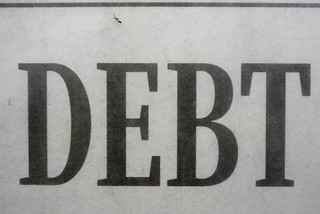In “Climbing Your Way out of Debt Part I,” we looked at the cost of paying down debt by focusing on credit cards with the highest balance before focusing on lower debt balances and loans. This time we examine how much money it will cost over the long term if you pay down credit cards charging the highest interest first. We’ll also examine the costs of emotion when it comes to borrowing money from family members.
Many people believe one of the best strategies for climbing your way out of debt is to pay off the debt charging the highest interest first. With $500 available each month for debt repayment, you instead decide to dedicate $447.50 to your Big Balance Card, paying the minimum balance toward your Fave Card and $30 to your family. Once you pay off your Big Balance Card you’ll put more money toward paying off your Fave Card. Once you’ve achieved a zero balance on your Fave Card you’ll put more money toward paying back your parents.
 On your Big Balance Card, you’ll pay $447.50 per month for 20 months plus a $305.27 payment for one month to pay off $7,500 plus $1,755.27 interest for a total of $9,255.27. Meanwhile, when it comes to your Fave Card you’ll pay the minimum due, $22.50 per month for 20 months, a $164.73 payment one month, $470 the following month and a final payment of $158.83. In 23 months you’ll have paid $243.56 worth of interest, making an original $1,000 of debt cost you $1,243.56.
On your Big Balance Card, you’ll pay $447.50 per month for 20 months plus a $305.27 payment for one month to pay off $7,500 plus $1,755.27 interest for a total of $9,255.27. Meanwhile, when it comes to your Fave Card you’ll pay the minimum due, $22.50 per month for 20 months, a $164.73 payment one month, $470 the following month and a final payment of $158.83. In 23 months you’ll have paid $243.56 worth of interest, making an original $1,000 of debt cost you $1,243.56.
You’ll also continue to pay your parents back with $30 per month for 22 months, $341.17 for one month and a final payment of $298.83. While this strategy takes 24 months to pay them back it’s a strategy that prevents you from paying interest for 24 months, unlike the other credit cards.
Using this strategy of paying off the debt carried on your Fave Card, Big Balance Card and with your parents will cost you $11,798.83 to pay off $9,800 worth of debt. Thus far, climbing your way out of debt by paying down the balance on credit cards with higher interest rates first saves you $162.70.
If you’ve ever borrowed money from parents or family members, you know the tension that can exist and the raised eyebrows you often receive from family members each time you buy a $4 latte in their presence while still owing them money. Sometimes the costs of debt are more than just financial. With $500 available for debt repayment you decide you’re tired of feeling judged by your parents so you’ll pay this debt first. You decide to pay them $252.50 each month for the next six months. With the remaining money, you’ll focus on paying what you can on your Big Balance Card, paying $225 per month for 5 months, $440 one month, $477.50 for 17 months and a final payment of 19.08. In 24 months you’ve paid back your parents and your Big Balance credit card. However, the interest you paid was $2,201.58 which means that the original $7,500 of debt cost you $9,701.58. Using most of your $500 each month for paying down your Big Balance Card, you focus on eliminating the debt on your Fave Card last. You pay $22.50 per month for 23 months, $480.92 for one month and $266.78 for the last month. Over the course of 25 months you pay $265.20 in interest making $1,000 of debt cost $1,265.20. Factoring in the amount of interest charged on your Big Balance Card and your Fave Card plus what you owed your parents, this strategy cost you $12,266.78.
As you can see from these three scenarios, paying the highest-rate debt first saves you the most money of the long haul while paying your family back first is the most expensive option. When it comes to climbing your way out of debt the old saying, “Rome wasn’t built in a day,” is certainly worth noting. While most people didn’t accrue all of their debt in one day, they shouldn’t expect to pay it all off in one day. Climbing your way out of debt takes self-discipline and is done one paycheck at a time.